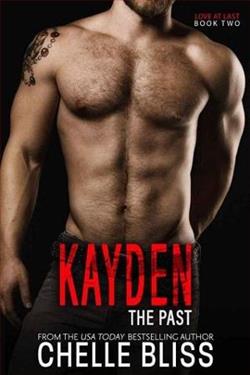Page 11 of The Honeymoon Affair
I opened it and looked at the Tiffany’s solitaire inside.
‘Ariel Barrett,’ he said. ‘I know you’re a free-spirited, independent, successful woman who doesn’t need a man in her life to be happy. But I’d be honoured if you’d become my wife.’
I was all those things. I was also a woman who hadn’t planned on getting married at all.
But I was in love with Charles, and that changed everything.
So I said yes.
Our engagement was mentioned in the trade papers and briefly in the national media too. Everyone loved the romance of it, the unknown agent who’d turned an unknown author into a mega success and who’d fallen in love in the process. However, when I revealed that I planned to move to Ireland with Charles and open my own agency in Dublin, my closest friends worried that I was sounding the death knell of my career. Over drinks with Ekene, another Saxby-Brown agent, and Maya, one of my favourite book publicists, they outlined their concerns about the plan. But despite my initial reservations, I was excited. I told them times were changing and I didn’t need to be tethered to a desk in London to do the best for my authors. I outlined my plans for the ABA and told Maya that I’d need someone to do PR work for me in London and that I hoped she’d be on board.
‘We’re all strong, confident women,’ I said. ‘We should support each other. Even if we might end up competing with each other sometimes.’ I turned to Ekene.
‘You’re right,’ she said. ‘It doesn’t matter that we’re working for different agencies, we’ll always be friends. Thankfully the book world isn’t as awful as some other industries when it comes to friendships. If I hear of authors that might suit you better than me, I’ll let you know.’
‘And vice versa,’ I promised her.
So Charles and I got married, I left Saxby-Brown, and I pitched ABA as a home for authors who wrote strong contemporary fiction, romantic fiction and thrillers. I guess I was basically covering almost all types of fiction except sci-fi, horror and erotica, though that didn’t stop them arriving in my inbox anyway.
Some of my Saxby-Brown novelists came with me, others stayed safe in the arms of the bigger company. I understood and I didn’t mind. In a relatively short period of time, ABA had secured a list of excellent writers who hoped I’d work the same magic for them as I had for Charles Miller. I didn’t manage to get an author shortlisted for the Booker, but two of my new clients quickly established themselves as strong sellers. I’d deliberately chosen them because I thought they’d do well commercially. Janice Jermyn wrote cosy crime (a misnomer if ever there was one – anyone who’s been a victim of a crime knows it’s never cosy) and Lucy Conway was the author of glamorous romantic fiction that I reckoned would sell by the shelfload.
I was right in both cases. The high-body-count murders of Janice’s books, which she now produces at the rate of two a year, always make the bestseller lists. And Lucy’s exotic blockbusters are the mainstay of airport bookshops everywhere. I love both women, as much for their friendship as for their brilliant writing and their excellent contribution to the agency’s bottom line. But back then they were only starting out, and my main income was from Charles’s royalties as well as the massive advance I’d managed to secure for his next novel, even though he hadn’t a clue what he was going to write yet.
Charles brought me to visit the Dublin house and I immediately saw why he’d bought it and why it would be perfect for us. Additionally, I thought as we walked around the garden, the mews at the back would make an ideal office for me.
Before I could lay claim to it, however, it became our temporary home, because wonderful though the main house was, it needed a lot of work to make it habitable. The builders had estimated five months for the renovations. It took double that, and as I said to Charles afterwards, the fact that we didn’t kill each other during that time was a miracle. Working and living in the same space together while also trying to oversee the house makeover was harder than I’d anticipated. Charles has a habit of speaking his dialogue out loud, and it didn’t matter to him that I might be on the phone trying to put together a deal as he wandered around the mews loudly quoting from his work in progress. When I’d first met him at Saxby-Brown, I’d thought he was one of the most practical writers I’d ever met, but his practicality extended only to the business part of it, not the actual writing, where his process was chaotic. He would often interrupt me, wanting my opinion on a particularly tricky paragraph, completely oblivious to what I might be doing at the time, arguing with me if I did come up with a suggestion and then arguing with himself about the merits of the entire book.
We were both getting tetchy by the time he decided to take himself off to a tiny cottage on the west coast of Ireland because he needed somewhere away from the sound of jackhammers and cement mixers to write. I was relieved, although it meant that Charles’s interruptions were replaced by even more interruptions from the builders, with their daily questions about knocking down walls and plastering ceilings. However, the builders were easier to deal with than Charles, and as he was getting more writing done at the cottage, it was ultimately a win-win situation overall.
The cottage actually belonged to Charles’s family, having been passed down by his great-grandmother, and the Millers shared time there among themselves. Although I was grateful for his absence during the week, I visited him at weekends, when we’d talk about his book, swim in the Atlantic Ocean and picnic in the cottage garden with its stunning view over Clew Bay. It was almost like our original courtship, when he’d travelled to London every fortnight to see me. Most of our time there was idyllic, the sex was fantastic, and the only fly in the ointment was the occasional weekend when Charles’s mother, Pamela, joined us.
Pamela and I had, as the Irish expression goes, somewhat ‘taken agin’ each other when Charles had first introduced us. Initially I’d thought we might get on, as he’d told me that she was an avid reader and loved books. Also, she was as unlike the traditional trope of a doting Irish mammy as it was possible to be. She was stylish and businesslike, and very much used to getting her own way. I admired her and wasn’t overawed by the force of her personality, which she seemed to take as a personal insult. I was also a little too London for her, too sassy, too metropolitan elite. She actually did use the words ‘metropolitan elite’ when we met. Over the years she would throw in ‘woke’ too, possibly because the agency supports a charity that champions ethnic voices in publishing. She also liked to tell me how I should run my business and how I should promote Charles’s work. At first I gritted my teeth and nodded, but over time I began to point out, probably too sharply, that I knew how to do my own job.
The thing is, Pamela was, and still is, a very successful woman in her own right, and she believed she always had something useful to bring to the table. She was the one who added a proper restaurant to the family pub’s more basic food offering, and when her husband died and Charles’s brother, Nick, took it over, she further augmented the Miller business empire by opening a café a few doors down from it. After Charles’s success with Winter’s Heartbreak, she restyled the café as a literary hang-out, with framed posters of famous Irish authors on the walls. Charles is in pride of place, along with Yeats, Joyce and Beckett. So far, Edna O’Brien is the only female author deemed good enough for Pamela’s gallery. She chairs a book club that regularly meets there, and has been quoted several times in the papers talking about the arts. She’s also been a guest speaker at a number of businesswomen’s functions as well as some literary events. She’s a powerhouse, and not only for her age (she’s nearly eighty). It’s a shame we didn’t hit it off.
Maybe that would have made all the difference.
Despite the chaos of the building work going on around me back in Dublin, my productivity soared and I felt confident about the growth of the agency, even if, as I said jokingly to Ekene, I was working out of a derelict house at the back of another derelict house. She was very encouraging and told me that ABA was becoming more and more respected for the calibre of the authors who had joined me. When I rang Charles to tell him this, he told me that it was exactly what I deserved because I was a human dynamo.
I’ve always liked the idea of being a human dynamo.
When the work on the house was eventually finished, I was very excited to move into the newly named Riverside Lodge. Given that I’d had a lot of input into the renovation and the decoration, it felt very much like my home, even though I hadn’t been part of the purchasing process.
‘At least it won’t take as long to do up the mews,’ I said as Charles and I looked down the garden from the window of the room he’d designated as his writing sanctuary in the main house. ‘It’s not a huge space and won’t need much to bring it up to spec.’
‘D’you know, I think it’s fine the way it is,’ he remarked. ‘Haven’t we been living there for nearly a year with no problems? I really don’t want to be distracted by more building work. I’ll need quiet time for my editing.’
I wasn’t going to let him divert me from the renovation of the mews by talk of his book. I told him I couldn’t possibly work out of a shed and that I needed a proper office. Charles kept suggesting different rooms in the house, while I continued to make the case for the mews, reminding him that it had always been earmarked for me.
‘It’s just . . . I was thinking . . . the mews might make a nice granny flat for Mum,’ he said.
‘You’re not serious?’ I looked at him in horror. ‘You want her to live here? I thought she was happy with her café and book club. And isn’t she close to your brother and his wife in Waterford?’
‘I wasn’t thinking about it for right now,’ he said. ‘But who knows what the future might bring.’
‘Charles, I can’t work in the same house as you, even a house this size,’ I said. ‘The mews was always supposed to be mine. If your mother eventually needs more care, we can have a family discussion about it then. Perhaps we should—’
‘Please let me decide what’s best for my own mother,’ he said.















